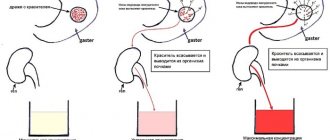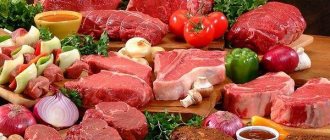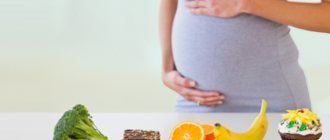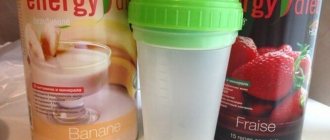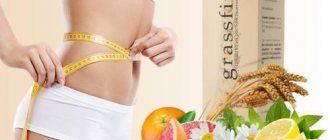Edited by an expert:
Nadezhda Primochkina, nutritionist – 11/14/2020
When addressing the issue of vegetarianism, it is necessary to find out what it is: a nutritional system or a debilitating diet?
Based on the principle of complete or partial abstinence from foods of animal origin, vegetarianism is divided into four main types:
- Ovo-lacto-vegetarianism - along with plant foods, you can consume dairy products and eggs.
- Ovo-vegetarianism allows the consumption of eggs and dishes containing them.
- Lacto-vegetarianism - you can eat dairy products.
- Veganism completely excludes the consumption of food of animal origin.
Now let's talk more specifically about the features of each of them.
What is a vegan diet?
A vegan diet is an eating plan that eliminates all animal products, including meat, fish, eggs, dairy and honey.
People decide to embrace veganism for a variety of reasons, such as ethical concerns or religious principles.
Others may choose to go vegan to reduce their environmental footprint, as plant-based diets are thought to generate fewer greenhouse gas emissions and use fewer natural resources.
However, the environmental impact of any diet depends on many factors, including how food is produced, packaged, and transported (1, 2).
Some also choose to follow a vegan diet for health reasons, since veganism is associated with many health benefits and may even help prevent certain chronic diseases (3).
In particular, vegan diets improve heart health, aid weight loss, and support blood sugar control (4, 5, 6).
Summary:
A vegan diet excludes all animal products, including meat and dairy products. People may adopt veganism for ethical, religious, environmental or health reasons.
results
As a rule, in a couple of weeks of a diet without meat and fish, you can lose 6 - 7 kilograms. People who have tried this nutrition system note a general improvement in their condition. Some ladies claim that they have overcome certain health problems, for example, flatulence, gastrointestinal problems, acne, and high blood pressure. Thus, many who started this diet switched to vegetarianism on a permanent basis.
At the same time, other people noted a constant desire to eat meat or sweets, as well as weakness and dizziness. It is difficult for the body to switch only to plant foods. Therefore, it is very important to listen to your body, and if you experience discomfort or weakness, you should immediately consult a doctor. In addition, it is important to take vitamins so that the diet does not result in problems with hair, teeth, nails and bones.
Doctors have different opinions on this diet. Some insist on the harmfulness and limitations of the menu, while others argue that this frees the body from waste and toxins, from the decomposition of products containing animal proteins. But in any case, if balance and caution are maintained, it will not harm.
We recommend reading about diabetes and a diet for losing weight for this disease. You will learn about the basic principles of diet No. 9, diet options, and nutrition rules for diabetes. And here is more information about diets for quick weight loss in a week.
A vegetarian diet without meat and fish is one of the most effective and balanced. It allows you to lose weight without harming your health and without limiting the body’s nutrients. But, like any other, diet is stressful, so it is important to follow moderation. If unpleasant processes and sensations appear, you should consult a doctor.
Health Benefits of Veganism
Research shows that a well-balanced vegan diet can improve several aspects of your health.
According to one review, vegans have a 75% lower risk of developing high blood pressure than omnivores or those who eat meat and plants (7).
They also tend to have a lower body mass index (BMI) and lower levels of total and LDL (bad) cholesterol. High levels of these markers are risk factors for cardiovascular disease (7).
Vegan diets can also help with weight loss and weight control.
One study of 18 women found that following a vegan diet for 6 months resulted in lower calorie and fat intake and faster weight loss compared to a low-calorie, omnivorous diet (8).
Some studies also suggest that veganism may be beneficial for controlling blood sugar levels and may help reduce the risk of developing diabetes (9, 10).
In fact, one study of nearly 61,000 people found that vegans were 2.6 times less likely to develop type 2 diabetes than omnivores (11).
A vegan diet may also reduce symptoms of osteoarthritis—including joint pain and swelling—and the risk of certain cancers, such as breast and prostate cancer (12, 13).
Summary:
Vegan diets are associated with many health benefits, including improved heart health, faster weight loss, improved blood sugar control, reduced joint pain and a reduced risk of cancer.
What can you eat on a vegan diet?
A healthy vegan diet should contain a variety of whole grains, proteins, healthy fats, and fruits and vegetables.
Foods such as nuts, seeds, legumes, soy products and nutritional yeast can help increase your protein intake throughout the day.
Meanwhile, avocado oil, coconut oil and olive oil are a nutrient-dense, vegan selection of healthy fats.
Here is a list of foods that will help you balance your menu on a vegan diet.
Fresh food
- Vegetables : asparagus, bell peppers, broccoli, cabbage, carrots, cauliflower, garlic, kale, onions, potatoes, spinach, tomatoes, zucchini, pumpkins, etc.
- Fruits : apples, bananas, blueberries, grapes, grapefruit, lemons, limes, kiwis, oranges, peaches, pears, pomegranates, strawberries, etc.
Frozen food
- Vegetables : broccoli, Brussels sprouts, carrots, cauliflower, corn, green beans, peas, mixed vegetables, etc.
- Fruits : blackberries, blueberries, cherries, mangoes, pineapples, raspberries, strawberries, etc.
Whole grains
Bread and pasta
- brown rice pasta
- whole grain pasta
- sprouted grain bread, such as Ezekiel bread
Protein sources
- Nuts : almonds, Brazil nuts, cashews, hazelnuts, macadamia nuts, peanuts, pecans, pistachios, walnuts, etc.
- Seeds : chia seeds, flax seeds, hemp seeds, pumpkin seeds, sesame seeds, sunflower seeds, etc.
- Legumes : black beans, chickpeas, red beans, lentils, white beans, peas, etc.
- Soy products : tempeh, tofu, etc.
- Protein powders : pea protein powder, brown rice protein, hemp protein, etc. You can learn more about the best types of proteins for vegans on this page - 9 best types of protein for vegans.
Dairy alternatives
- Milk substitutes : almond, cashew, coconut, flaxseed, oat, rice and soy milk, etc.
- Yogurt substitutes : almonds, cashews, coconut, flax, soy yogurts, etc.
- Vegan cheese : vegan parmesan cheese, etc.
Egg alternatives
- aquafaba
- arrowroot powder
- chia seeds
- corn starch
- flaxseed meal
- prepackaged vegan egg replacer
- silken tofu
Healthy fats
Snacks
- edamame
- black chocolate
- dried fruits
- fruit peel
- hummus
- nut butter
- pita chips
- popcorn
- roasted chickpeas
- seaweed chips
- muesli
Sweeteners
Spices and seasonings
Please note that many processed vegan foods, such as vegan meat substitutes, often contain sodium, fillers, additives and other ingredients that may be harmful to your health.
Try to stick to eating mostly whole, unprocessed foods and avoid meat substitutes and other vegan ingredients and prepared foods.
Summary:
A balanced vegan diet should include a wide variety of fruits, vegetables, whole grains, proteins and healthy fats.
Recipes
Cottage cheese casserole
Ingredients:
- sugar 70 g;
- raisins 50 g;
- cottage cheese 300 g;
- vanilla 5 g;
- semolina 100 g;
- 1 egg.
Mix cottage cheese with sugar, add vanilla, egg and raisins to the resulting mixture. Add semolina, then mix thoroughly. Pour the dough into a silicone mold. Bake for 15-30 minutes in a well-heated oven, checking for doneness.
Vegetarian cabbage soup
Ingredients:
- carrots 1 pc.;
- potatoes 2-3 pcs.;
- white cabbage 500 g;
- herring 1 root;
- tomatoes 3 pcs.;
- asafoetida - 1 pinch on the tip of a knife;
- sweet pea;
- bay leaves 2 pcs.;
- greens (parsley and dill).
Cut the potatoes in half and place in boiling water. Cut the stems from the cabbage leaves into large squares and add to the boiling potatoes. Add sweet peas and bay leaves. Grate the celery root on a coarse grater, twist the leaves and chop them coarsely. Add everything received to the pan. Grate the carrots on a fine grater and add along with asafoetida to the water with vegetables. Simmer on fire for about 10 minutes. Season the finished dish on a plate with sour cream and garnish with fresh herbs.
Broccoli soup
Ingredients:
- bulb;
- vegetable broth 350 ml;
- soy milk 240 ml;
- broccoli 300-350 g;
- potatoes 2 pcs.;
- garlic cloves 3-4 pcs.;
- spices: black pepper, cumin, salt;
- sesame oil - 1 spoon.
Place chopped garlic and onion in a third of the broth, cook for 5 minutes, then add potato cubes and the remaining broth. Cook for 15 minutes, then add the broccoli. Cook for another 5 minutes, add spices. Grind the vegetables in a blender. Place the resulting mass in soy milk and heat slightly. The resulting dish is rich in vitamin E, ascorbic acid, fiber, protein, calcium, sodium, iron and beta-carotene.
Sample meal plan
Here's a sample meal plan for one week that features several nutrient-dense foods you can eat on a vegan diet.
Monday
- Breakfast : Bacon tempeh with sautéed mushrooms, avocado and arugula
- Lunch : whole grain pasta with lentil meatballs and side dish
- Dinner : Cauliflower and chickpea tacos with guacamole and pico de gallo
- Snacks : popcorn, kale chips and granola
Tuesday
- Breakfast : Coconut yogurt with berries, walnuts and chia seeds
- Lunch : Baked tofu with sautéed red cabbage, Brussels sprouts and couscous greens
- Dinner : Mushroom lentil roll with garlic, cauliflower and Italian green beans
- Appetizers : Bell peppers with guacamole, fruit peels and seaweed chips
Wednesday
- Breakfast : Sweet potato sandwich with peanut butter and banana
- Lunch : tacos with tempeh, quinoa, avocado, tomatoes, onions, beans and cilantro
- Dinner : Oat risotto with Swiss chard, mushrooms and pumpkin
- Snacks : mixed berries, vegan protein shake and walnuts
Thursday
- Breakfast : Eggless pie with silken tofu, broccoli, tomatoes and spinach
- Lunch : Chickpea and spinach curry with brown rice
- Dinner : Mediterranean lentil salad with cucumbers, olives, peppers, sun-dried tomatoes, cabbage and parsley
- Snacks : Roasted edamame, sliced pear and energy balls made from oats, chia seeds, nut butters and dried fruits
Friday
- Breakfast : Overnight oats with apple slices, pumpkin seeds, cinnamon and nut butter
- Lunch : Vegetarian sandwich with black beans, steamed broccoli and sweet potato wedges
- Dinner : Vegan mac and cheese with nutritional yeast and greens
- Snacks : pistachios, homemade granola and coconut chia pudding
Saturday
- Breakfast : Stewed broccoli, cabbage, tomatoes and zucchini with tempeh
- Lunch : Garlic-ginger tofu, stir-fried vegetables and quinoa
- Dinner : Bean salad with black-eyed peas, tomatoes, corn, bell peppers and onions
- Snacks : Roasted pumpkin seeds, frozen grapes and celery with almond butter
Sunday
- Breakfast : Whole grain toast with avocado and nutritional yeast, plus a vegan protein shake
- Lunch : Lentil chili with roasted asparagus and baked potato
- Dinner : vegetable paella with brown rice, onions, tomatoes, bell peppers, artichokes and chickpeas
- Snacks : almonds, fruit salad and carrots with hummus
Summary:
The sample meal plan above includes many of the healthy ingredients and dishes you can enjoy on a vegan diet.
Potential Disadvantages and Precautions
While a well-balanced vegan diet can be healthy and nutrient-dense, a vegan diet that is not properly planned can be detrimental to your health.
Here are a few factors you may want to consider when starting a vegan diet.
Nutrient deficiencies
Vegan diets may be associated with an increased risk of deficiencies in certain nutrients.
This is because meat, fish, and poultry are rich in several important nutrients that are mostly lacking in plant foods, including protein, iron, zinc, vitamin B12, phosphorus, and omega-3 fatty acids (14).
Animal products, such as eggs and dairy products, are also rich in protein and micronutrients, such as calcium, potassium, phosphorus, iodine, iron, and magnesium (14, 15).
Eliminating these foods from your diet completely may increase your risk of nutritional deficiencies.
In particular, vegans may be at greater risk for deficiencies in vitamin B12, vitamin D, calcium, iodine, iron, and protein (16, 17).
This can lead to an increased risk of problems such as anemia, weakened bones, and weakened immunity (18, 19, 20, 21, 22).
Low levels of vitamin B12 may be especially important during pregnancy, as a deficiency can potentially increase the risk of neural tube defects and damage your baby's brain and nervous system (23).
Including a variety of nutrient-dense ingredients and fortified foods in your diet is essential to meeting your nutritional needs.
Vitamin B12 and vitamin D can be found in fortified foods such as plant-based milks, cereals, and nutritional yeast.
Meanwhile, protein, zinc and iron are found in legumes, soy products, nuts and seeds.
Including moderate amounts of iodized salt in your diet can also help you meet your iodine needs.
Nutritional supplements
Keeping your body supplied with the nutrients it needs can be challenging when following a vegan diet.
Some nutrients, such as vitamin B12, vitamin D, and iodine, are found primarily in animal products and some fortified foods.
Additionally, although non-heme iron is found in a variety of plant foods, it may not be as well absorbed as the heme iron found in animal foods (24).
Taking a multivitamin or other supplement can help fill nutritional gaps and provide your body with essential micronutrients that you may be missing.
For best results, look for a multivitamin that contains vitamin B12, zinc, iron, vitamin D, and calcium.
Keep in mind that it is generally recommended to take more vitamin B12 than the recommended daily intake (RDI) because your body can only absorb small amounts at a time (25).
Aim for 2,000–2,500 mcg of vitamin B12 per week. This amount can be divided into several smaller doses and may require a separate dose in addition to a multivitamin (25).
You may also consider taking algal oil, a plant-based form of omega-3 fatty acid. Your body needs this type of fat for optimal heart health, brain function, and disease prevention (26).
Supplements such as vegan B12 and algal oil can be found online.
Summary:
If not planned correctly, vegan diets can increase the risk of nutritional deficiencies. Eating a balanced diet and taking certain supplements will help you get the nutrients your body needs.
Is it possible to lose weight without meat?
For a long time it was believed that for a safe and productive
To lose weight, the diet menu must include meat. It should be non-greasy. Meat contains a large amount of animal proteins, which are necessary for building muscles and burning fat.
The body spends much more energy to digest such food.
In fact, there is nothing wrong with such a meat-free diet. With a balanced menu, it will really help you lose extra pounds. Switching to plant-based foods will help cleanse the body of toxins and waste. But if you refuse meat dishes, swelling may appear. To prevent this from happening, you need to drink more plain still water and give up tea and coffee.
To ensure that the diet does not harm your health, it must be full of vitamins and microelements. Some people believe that a meat-free system means that you only need to eat fruits, vegetables, and side dishes. But it's not right. If the human body does not receive protein and vitamins, then weight loss occurs due to muscle mass, not fat tissue.

In addition, in order to maintain strength for vitality, he begins to slow down his metabolism. And as a result, the weight stays the same or, on the contrary, increases. A person who is losing weight is forced to reduce the amount of calories they consume. As a result, the body is depleted, metabolism and the functioning of vital organs are disrupted.
Thus, in a diet without meat, it is important to understand that this product must be replaced with others containing animal protein, for example, cottage cheese, cheeses, low-fat yogurt, kefir .
In addition, in order to avoid the restructuring of the intestines only on plant foods, the duration of the diet without meat should be no more than 2 - 3 weeks. Otherwise, the body will have difficulty adapting, and severe pathological conditions will arise.
We recommend reading about a low-carb diet for weight loss. You will learn about the basic principles of weight loss, its advantages and disadvantages, a sample menu for the week and month, and weight loss results. And here is more information about the therapeutic diet according to Pevzner.
Summarize
- Well-balanced vegan diets are healthy, nutritious and are associated with a range of benefits, including improved heart health, normalized blood sugar levels and body weight.
- Following a vegan diet can help you include many valuable foods in your diet, providing your body with the nutrients it needs.
- Keep in mind that supplementation and proper planning are important to avoid deficiencies in some important nutrients.
Vegan diet
